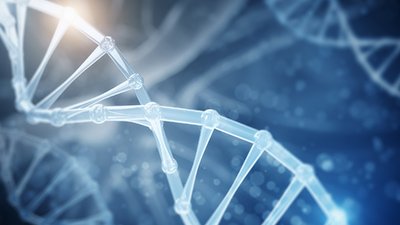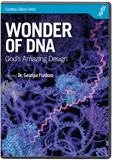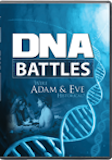Breaking the Code
Breaking the code was only the beginning.
News Source
- Discover blog: “ENCODE: The Rough Guide to the Human Genome”
Less than a year into the new millennium the Human Genome Project identified the nearly three billion nucleotides in the human genome—a remarkable accomplishment. But like a mysterious unknown language, the genome did not come with a lexicon explaining its meaning. The multinational project nicknamed ENCODE—for Encyclopedia Of DNA Elements—was launched to learn the language of the human genome. The recent release of its second phase via 30 papers published in various journals contains exciting information. But these publications are creating controversy among some evolutionists who complain about the media “hype” and dispute the ENCODE researchers’ conclusions.
As researchers studied the human genome, they soon learned that only about 2% of the genome consisted of genes, the rest being nicknamed “junk.”
DNA consists of sequences of nucleotides, like letters in an alphabet. Groups of nucleotides that direct the formation of particular proteins are called genes. As researchers studied the human genome, they soon learned that only about 2% of the genome consisted of genes, the rest being nicknamed “junk.”
Many evolutionary scientists have maintained that “junk DNA” represents the evolutionary leftovers from millions of years of evolution. They cannot explain, however, why useless “junk,” 98% of our DNA, would hang around for millions of years, surviving the natural selection process, when it had no function. Intuitively, of course, scientists realized that somewhere in that 98% must be something useful, but both the name and the concept of “junk” has persisted.
As researchers began cracking our genome’s code, they found that humans only have about 20,000 genes, not nearly enough to explain our complexity. Many human genes resemble other organisms’ genes, a fact often held up as “proof” that all living things share an evolutionary ancestry. Creation scientists, of course, recognize that our common Designer has logically used similar genes to make similar proteins to serve the biochemical and structural needs of many organisms. Furthermore, this discovery demonstrated that there had to be more information in the genome than just those 20,000 genes.
By 2007, the preliminary phase of the ENCODE project, which analyzed just 1% of the human genome, had generated strong suspicion that most of the genome was functional. The recent release of the last five years of ENCODE research has confirmed that at least 80% of the genome is “biochemically active,” evidence that it probably “does” something. ENCODE scientist Tom Gingeras explains, “Almost every nucleotide is associated with a function of some sort or another, and we now know where they are, what binds to them, what their associations are, and more.”
With further research studying additional cell types, according to ENCODE’s lead coordinator Ewan Birney, “It’s likely that 80 percent will go to 100 percent. We don’t really have any large chunks of redundant DNA. This metaphor of junk isn’t that useful.” He adds that ENCODE results have shown the human genome is “full of things doing stuff.” But what stuff each part is doing will be the subject for ENCODE’s next phase. Birney thinks, “It’s going to take this century to fill in all the details.”
Much of the non-coding DNA is engaged in gene regulation—determining when genes make their proteins.
Much of the non-coding DNA is engaged in gene regulation—determining when genes make their proteins. Scientists have long realized that individual cell types must have a way to switch on the part of the DNA they need, but the discovery that the majority of the “junk” DNA is involved in this regulatory function has come as a surprise. ENCODE researchers have also learned that very small variations in this non-coding DNA are associated with increased risk for many common diseases. This information holds hope that many diseases may someday be amenable to treatments never before imagined.
Some evolutionists are upset about the findings. For instance, even though the “biochemical activity” the ENCODE researchers documented in 80% of the genome was specifically associated with RNA or DNA (not just random chemical reactions),1 evolutionist bloggers are hastening to point out that just because a portion of DNA engages in biochemical activity, there is no reason to believe it actually has a function.2
Toronto biochemist Larry Moran, who was not involved in the project, in his evolutionary blog “Sandwalk,” says the journalist interviewing Birney “blew it,” adding, “The creationists are going to love this. . . . This is going to make my life very complicated.”3
Secularists are determined to write God out of our origins, so we are not surprised to see the controversy erupt over evidence of intricate complexity designed throughout the human genome. Molecular geneticist Dr. Georgia Purdom explains, “Evolutionists don't like the definition of ‘functional’ that ENCODE is using. They truly believe that even if the DNA is transcribed to RNA that it is still not doing anything as RNA. Since organisms are usually very efficient in the sense that they have highly regulated pathways to turn on and off genes, I find it hard to believe that they would waste energy transcribing something that has no function. That is where the worldview difference really comes into effect. I don't believe the genome is the result of random chance over time with a lot of evolutionary leftovers still prevalent in our DNA that haven't been ‘selected out’ yet. I believe the genome was designed and created by God and that much of the ‘junk’ DNA will be found to have a function because God is a logical and orderly Creator.” Dr. Purdom will explore the evolutionists’ objections more thoroughly in her Answers in Genesis blog post, part 2 of her coverage of ENCODE, next week.
Experimental science like ENCODE deciphers the genetic code, but even ENCODE cannot look back through time or show that people evolved through natural processes of molecules-to-man evolution. However, these discoveries have given us a glimpse of God’s amazing creative design. They also hint at the often subtle ways “mistakes” in the genome that have crept into that design in the wake of sin’s curse to cause disease. We look forward eagerly to the additional information to be learned as research continues as well as to future medical applications.
Further Reading
- Molecular geneticist Dr. Georgia Purdom discusses the ENCODE results in her blog. Also be on the look-out for the next installment of her blog, which will detail why evolutionists are downplaying the ENCODE results and calling the excitement about it “media hype.”
For More Information: Get Answers
Remember, if you see a news story that might merit some attention, let us know about it! (Note: if the story originates from the Associated Press, FOX News, MSNBC, the New York Times, or another major national media outlet, we will most likely have already heard about it.) And thanks to all of our readers who have submitted great news tips to us. If you didn’t catch all the latest News to Know, why not take a look to see what you’ve missed?
(Please note that links will take you directly to the source. Answers in Genesis is not responsible for content on the websites to which we refer. For more information, please see our Privacy Policy.)
Footnotes
- According to an overview published in Nature, “The vast majority (80.4%) of the human genome participates in at least one biochemical RNA- and/or chromatin-associated event in at least one cell type. Much of the genome lies close to a regulatory event.” (from The ENCODE Project Consortium, “An integrated encyclopedia of DNA elements in the human genome,” Nature, 489:57–74 (September 6, 2012).
- T. R. Gregory, “A Slightly Different Response to Today’s ENCODE Hype,” Genomicron, September 5, 2012, http://www.genomicron.evolverzone.com/2012/09/a-slightly-different-response-to-todays-encode-hype.
- L. Moran, “ENCODE Leader Says that 80% of Our Genome Is Functional,” Sandwalk (blog), September 5, 2012, http://sandwalk.blogspot.com/2012/09/encode-leader-says-that-80-of-our.html.
Recommended Resources

Answers in Genesis is an apologetics ministry, dedicated to helping Christians defend their faith and proclaim the good news of Jesus Christ.
- Customer Service 800.778.3390
- © 2024 Answers in Genesis





